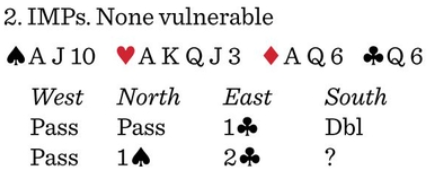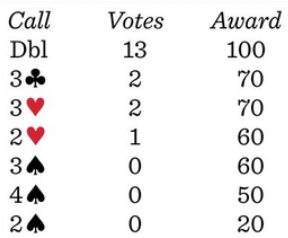
What’s your call?
| 2♦ | 2♥ | 2♠ | 2NT | |
| 3♣ | 3♦ | 3♥ | 3♠ | 3NT |
| 4♣ | 4♦ | 4♥ | 4♠ | 4NT |
| 5♣ | 5♦ | 5♥ | 5♠ | 5NT |
| 6♣ | 6♦ | 6♥ | 6♠ | 6NT |
| 7♣ | 7♦ | 7♥ | 7♠ | 7NT |
| Pass | Dbl |
The red double cards are getting a lot of table time this month.
Lawrence describes double as showing around 18 points with three spades, “and that is exactly what you have. You have a few extra, but you can catch up on the values next time. A more difficult problem is what to do next if partner bids 2♠, which is his most likely bid.”
The Sutherlins also see their second double as fairly standard. “It is still takeout and shows 16-plus points and three-card support for partner. How we continue will depend on partner’s response. 3NT, 4♥ and 4♠ are all possible game contracts.”
Korbel says, “To me, the choices are double and 3♣. 3♣ aims directly toward 3NT, which will certainly be right if partner has a club card. But we will be forced to bid 4♥ over partner’s 3♠. Double keeps the auction lower, and if partner passes, we may go plus 300 or even plus 500 right here.”
Colchamiro conducts inventory: “Doesn’t double here almost always show fewer than four cards in spades? Check. Doesn’t double here show extras? Check. Even if East is void in hearts, we figure to go plus 300. So the downside is only 4 IMPs. If partner passes, can East take more than six club tricks after I lead the ♣Q? This would be more difficult at matchpoints, where my plus 300 could be a zero or a top.”
Lee uses the flexibility of doubling “to keep everything – hearts, notrump and possibly spades – in the picture. If partner passes, I’m thrilled.”
“Double,” agrees Abdou, “should be a good hand with three spades. I will bid 3♥ over 2♠. A cuebid at my second or third turn will not allow me to show hearts at a reasonable level and is an overbid with the valueless ♣Q.”
“I’m too strong to bid only 2♥ this time around,” says Cohen. “If you took away one ace, I’d bid 2♥.”
Meyers has it all planned out after her double: “If partner bids 2♦ , I will bid 2♥, which hopefully paints the picture. If partner bids 2♠, I will bid 3♥. If partner bids 2NT, I will raise.”
Boehm and Kennedy decide to first establish a game force by bidding 3♣. “If partner, by chance, bids diamonds,” postulates Kennedy, “I’ll continue with 3♥.”
“2♥ or 3♥?” muses Stack, who ultimately decides on 3♥. “Although there are four or five losers in this hand, bidding only 2♥ with 23 high-card points and a great heart suit does not feel like enough. A 3♣ cuebid is a possibility, but what would this accomplish? It doesn’t give the hand any specific direction.”
Rigal calls 3♥ the equivalent of an Acol two-bid. “I need to get hearts into the equation, since we can make a heart game facing as little as:
♠x x x x ♥x x x ♦ K x x ♣x x x, but we can’t make 4♠.”
Sanborn is content to bid just 2♥. “At first glance, this looks like a huge underbid, but if partner can’t bid again, I might be high enough. Facing a hand with no entries, I have a lot of losers. If I catch a 2♠ rebid, I will try game there.”


